|
|
|
Sort Order |
|
|
|
Items / Page
|
|
|
|
|
|
|
| Srl | Item |
| 1 |
ID:
133456
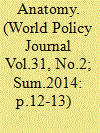

|
|
|
|
|
| Publication |
2014.
|
| Summary/Abstract |
Alternative currency is a privately developed form of money that is used as a substitute to national currency in designated areas. It is not regulated by national governments or banks. A familiar example is the e-currency, Bitcoin. However, Bitcoin is neither the only nor the oldest example of alternative money. The chiemgauer, Brixton pound, sardex, and the dam are examples of alternative money currently in use in Germany, England, Italy, and the Netherlands, respectively. The goal with these currencies is to promote the idea of spending locally. By keeping the currency within the designated area, the local economy is able to prosper regardless of the state of the national economy. This enables communities to establish local markets that are less affected by national trends
|
|
|
|
|
|
|
|
|
|
|
|
|
|
|
|
| 2 |
ID:
133459
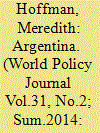

|
|
|
|
|
| Publication |
2014.
|
| Summary/Abstract |
When the peso hit rock bottom in January, Ande Wanderer rang up her money dealer-a former official in Argentina's national government. She'd sold off her stocks, cashed in her American savings, and wired him the money. Now she rushed to his office, a ninth floor room in downtown Buenos Aires. The official exchange rate was 8 pesos to the dollar. But her dealer gave her 11-the black market rate at the time-and kept a small fee for himself. That meant she got some 40 percent more pesos for her U.S. money.
|
|
|
|
|
|
|
|
|
|
|
|
|
|
|
|
| 3 |
ID:
133453
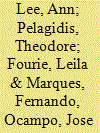

|
|
Big question: how much confidence do you have in your nation's banking system?
/ Lee, Ann; Pelagidis, Theodore; Fourie, Leila; Marques, Fernando, Ocampo, Jose Antonio, Antonini, Massimo, Naik, Prithvi, Britto, Neil
|

|
|
|
|
| Publication |
2014.
|
| Summary/Abstract |
The global banking system is the fundamental conduit of value within nations and across borders. Since the last global financial crisis, however, the role of banks as a repository of value has come increasingly into question. Today, with a fragile recovery in so much of the world, banks and those who manage and regulate them are under attack. We asked our panel of global experts how this crisis of confidence is playing out in their nation or region.
|
|
|
|
|
|
|
|
|
|
|
|
|
|
|
|
| 4 |
ID:
133463
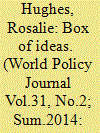

|
|
|
|
|
| Publication |
2014.
|
| Summary/Abstract |
CANKUZO PROVINCE, Burundi-Last November, Sedar Zamukulu Watula and 30 other Congolese refugees waited, perched on a circle of wobbly wooden benches in Kavumu Refugee Camp in western Burundi. Watula, 27, sweat in the heat, unusual for the rainy season. He was used to waiting-for food, for soap, for peace in his hometown of Goma in eastern Democratic Republic of Congo (DRC). But this time the wait was different. He'd come to hear a mzungu (white person) talk about a new project that was about to arrive in the camp-the Ideas Box
|
|
|
|
|
|
|
|
|
|
|
|
|
|
|
|
| 5 |
ID:
133464
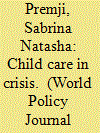

|
|
|
|
|
| Publication |
2014.
|
| Summary/Abstract |
In the winding alleyways of Mlolongo, one of Kenya's densest slums, heavy rainfalls from the previous night carpet the road with mud and animal waste, making both nearly impossible to avoid. Visitors approach and remove their shoes at the door to Mama Agnes' home, a mud shack, then step into a room where the air is pungent with the smell of urine and feces. In the darkness, one misstep and a visitor stumbles upon an infant, who seems unshaken by the accidental nudge. A few steps further lie two dozen more infants, none older than 18 months-some sitting on a broken couch, many lying on the concrete ground. Though all awake, their perfect little bodies remain still, only their bellies rising with each breath. In an eight-foot square space, there are at least 25 babies, and the only sound-silence.
|
|
|
|
|
|
|
|
|
|
|
|
|
|
|
|
| 6 |
ID:
133455
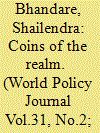

|
|
|
|
|
| Publication |
2014.
|
| Summary/Abstract |
OXFORD, England-We live in a globalized world where financial developments in one region can have an impact on a vastly different and geographically disparate location. The forces joining them are those of money, wealth, and finance, which are deeply interlinked, or so we tend to think. But the world around us has always been globalized, albeit to different degrees and involving different shades of financial undercurrents. An interesting prism to see this continual globalization is through the role itinerant and global currencies and monetary unions have played.
Money is often defined as "as any object (or record of that object) which is regularly used to make payments according to a law which guarantees its value and ensures its acceptability." Acceptance is thus at the core of any particular object being used as money. The spread of monetary traditions across regions happens because people from diverse locations accept particular monies, in the form of coins, paper, or other instruments, to make payments. The fact that coins can circulate as monetary objects greatly enhances their utility. They enable money to be spent and saved by facilitating their division.
|
|
|
|
|
|
|
|
|
|
|
|
|
|
|
|
| 7 |
ID:
133462
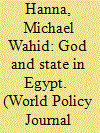

|
|
|
|
|
| Publication |
2014.
|
| Summary/Abstract |
During a private conversation following Egypt's bitterly contested and closely fought presidential election of 2012, a Western diplomat marveled, naively, at the multitudes of veiled women who had come out to support the old regime's candidate, the avowedly anti-Islamist figure of Ahmed Shafik. It was during this campaign that strongly held anti-Islamist themes were aired widely and used to mount a campaign against the potent, often bigoted, Muslim Brotherhood. Many of these same views were advanced in support of the military's removal of the Brotherhood's Mohamed Morsi, victorious candidate for the presidency and, with his electoral victory, successor to President Hosni Mubarak.
|
|
|
|
|
|
|
|
|
|
|
|
|
|
|
|
| 8 |
ID:
133421
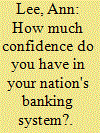

|
|
|
|
|
| Publication |
2014.
|
| Summary/Abstract |
The global banking system is the fundamental conduit of value within nations and across borders. Since the last global financial crisis, however, the role of banks as a repository of value has come increasingly into question. Today, with a fragile recovery in so much of the world, banks and those who manage and regulate them are under attack. We asked our panel of global experts how this crisis of confidence is playing out in their nation or region.
|
|
|
|
|
|
|
|
|
|
|
|
|
|
|
|
| 9 |
ID:
133460


|
|
|
|
|
| Publication |
2014.
|
| Summary/Abstract |
A typical Chinese tourism website advertising a week in New York City including three days of sightseeing, one day of shopping on Fifth Avenue, and one day looking at real estate investment opportunities-condos preferred, and ideally of the luxury variety. Chinese tourists, admittedly not the poorest segment of this society, now outnumber and outspend American tourists. And when they return home, they regularly comment about the overseas "bargains" they found. Even for ordinary Chinese who've never ventured abroad, the prices of overseas products continue to fall. Many have come to accept a constantly strengthening currency as the natural order.
|
|
|
|
|
|
|
|
|
|
|
|
|
|
|
|
| 10 |
ID:
133467
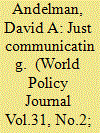

|
|
|
|
|
| Publication |
2014.
|
| Summary/Abstract |
-In March 1975, in what would turn out to be the final month of the war in Cambodia, I thought it might be a nice touch to place a call to my bride of six months and wish her a happy birthday. My interpreter/fixer/photographer, Dith Pranh, advised me to book the call a week or so in advance, which I did at the PTT (Post Telegraph)-the only locale where an international call had even a prayer of going through. At the appointed time, I appeared there and, after a wait of only several hours, the operator announced that my party was on the line in New York, and I could pick up "the apparatus" in Cabin #1. I lifted the phone and there, 7,000 miles away, was a very faint voice of Susan making its way through a cloud of electronic noise, crackles, and pops. We shouted at each other for a minute or so, before we finally gave up on any meaningful communication.
|
|
|
|
|
|
|
|
|
|
|
|
|
|
|
|
| 11 |
ID:
133458
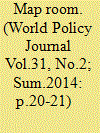

|
|
|
|
|
| Publication |
2014.
|
| Summary/Abstract |
Remittances to developing countries were a resilient source of external nancing during the recent global
financial crisis. According to the World Bank, remittances from developing countries are expected to reach $436 billion by the end of 2014. In this Map Room, World Policy Journal examines the in- ows and out- ows as a percentage of GDP in Asia. All percentages are based on World Bank and IMF 2012 data.
|
|
|
|
|
|
|
|
|
|
|
|
|
|
|
|
| 12 |
ID:
133457
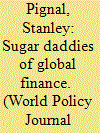

|
|
|
|
|
| Publication |
2014.
|
| Summary/Abstract |
LONDON-One of the cornerstones of Marxist-Leninist thinking is that the state should control the "commanding heights" of an economy-industry, agriculture, infrastructure, and, perhaps above all, money and banking. That vision has largely perished, with one gaping exception. Government remains omnipotent in the financial system, not only on Wall Street or Threadneedle Street, but far beyond. Across the world, the state weighs in on all sides of the ledger, insuring both a bank's assets (mortgages and loans) and its liabilities (deposits). State intervention in banking ranges from muscular day-to-day regulation through to crisis-time bailouts, and is an entirely accepted feature of the financial system. Financiers complain about excessive red tape, because that is what all businessmen do. But absent the state's involvement in their sector, it is a safe guess far fewer would still be gainfully employed following the carnage of 2008. Those who survived would likely find their ensuing careers to be nasty, brutish, short, and entirely devoid of outsized bonuses.
|
|
|
|
|
|
|
|
|
|
|
|
|
|
|
|
| 13 |
ID:
133461


|
|
|
|
|
| Publication |
2014.
|
| Summary/Abstract |
GAZA-Mohammed Alhwani stands in the courtyard of his school, gazing casually beyond he view of the camera. He wears a baggy sweatshirt and a backpack slung over one shoulder. He looks careless, free, and very much his 12 years of age. Several hours later, Mohammed rests next to a jerry-rigged electricity panel, yards beneath the earth, with hard, weary eyes-buried in the claustrophobic heart of one of Gaza's smuggling tunnels, an intricate network of underground passageways that illegally- under the laws of at east three nations- pass under international borders from Egypt into the Gaza territory.
|
|
|
|
|
|
|
|
|
|
|
|
|
|
|
|
| 14 |
ID:
133465
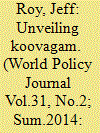

|
|
|
|
|
| Publication |
2014.
|
| Summary/Abstract |
In the middle of India's southernmost state of Tamil Nadu is the hamlet of Koovagam--a spit of dry dust surrounded by two empty rice fields and crisscrossing dirt pathways that converge like veins into the heart of town. At the center is a temple--a modest structure adorned with statues of gods and goddesses, where incense sticks burn. Surrounding the temple are market stalls that, on a normal day, offer displays of spices, flour, and seasonal fruits and vegetables for the town's handful of residents. But, on the full moon of the Chithirai month of the Tamil calendar, generally late April or early May, flamboyant arrays of offerings, religious figurines, and refreshments fill the stalls for tens of thousands of townsmen, women, children, and Aravanis, or transgender pilgrims.
|
|
|
|
|
|
|
|
|
|
|
|
|
|
|
|
| 15 |
ID:
133466
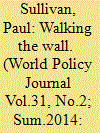

|
|
|
|
|
| Publication |
2014.
|
| Summary/Abstract |
The concrete and steel tsunami wall at a nuclear plant south of Tokyo is nearly 50 feet high and stretches a mile long. It is only one of a host of other earthquake and tsunami refits-waterproofing some of the most vital areas of the plant, backing up cooling systems, and improving venting for the facility in the event of hydrogen build up. On March 11, 2011, known as 3/11 in Japan, in the aftermath of the nuclear disaster at Fukushima Daichi, thousands died in the earthquake and resulting tsunamis; countless others lost their lands and livelihoods. There were a number of casualties from stress, dislocation, and more, especially among the elderly. And worse yet, future health fallouts are still to be seen. It was unquestionably a social and cultural calamity for a country that has had so many in its past, yet always seems to recover and come back stronger than ever.
|
|
|
|
|
|
|
|
|
|
|
|
|
|
|
|
|
|
|
|
|